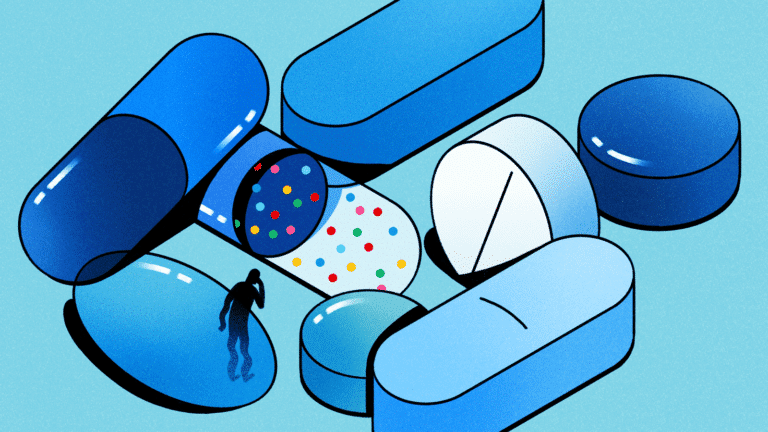Antidepressants are widely used medications designed to alleviate symptoms of clinical depression and other mental health conditions. These medications have transformed the way depression is managed, offering relief to millions of people worldwide. While their primary use is to treat depression, antidepressants are also prescribed for conditions like anxiety disorders, obsessive-compulsive disorder (OCD), post-traumatic stress disorder (PTSD), and even chronic pain.
This article provides an in-depth look at how antidepressants work, their types, side effects, and tips for using them effectively.
How Antidepressants Work

The precise way antidepressants work is not entirely understood, but they are believed to alter the levels of certain neurotransmitters in the brain. Neurotransmitters like serotonin and noradrenaline play a significant role in regulating mood, emotions, and pain perception. By increasing or balancing these chemicals, antidepressants can help improve mood and reduce the symptoms of depression.
While antidepressants address the symptoms of depression, they don’t necessarily tackle its root causes. As such, they are often used alongside therapy or lifestyle changes, particularly for moderate to severe depression.
Effectiveness of Antidepressants
Research shows that antidepressants are particularly effective for people with moderate to severe depression. For mild depression, they are usually only recommended when other interventions, like therapy or lifestyle adjustments, haven’t been effective.
Many people begin to notice improvements in their mood within one to two weeks of starting medication, but it can take up to six weeks or longer to feel the full effects. Patience is key, as is consistent communication with your doctor to monitor progress and adjust dosages if necessary.
Types of Antidepressants
Antidepressants come in several different types, each working in unique ways to address symptoms of depression.
Selective Serotonin Reuptake Inhibitors (SSRIs)
SSRIs are among the most commonly prescribed antidepressants due to their effectiveness and relatively mild side effects. They work by increasing serotonin levels in the brain. Common SSRIs include fluoxetine (Prozac), sertraline (Zoloft), and citalopram (Celexa).
Serotonin-Noradrenaline Reuptake Inhibitors (SNRIs)
SNRIs target both serotonin and noradrenaline, making them an option for those who don’t respond well to SSRIs. Examples include venlafaxine (Effexor) and duloxetine (Cymbalta).
Noradrenaline and Specific Serotonergic Antidepressants (NASSAs)
NASSAs are sometimes prescribed for individuals who cannot tolerate SSRIs. They may cause drowsiness initially but tend to have fewer sexual side effects. Mirtazapine (Remeron) is a common NASSA.
Tricyclic Antidepressants (TCAs)
TCAs are older antidepressants that are effective but associated with more side effects. They are typically prescribed when other medications haven’t worked. TCAs like amitriptyline and nortriptyline can also be used for chronic pain management.
Serotonin Antagonists and Reuptake Inhibitors (SARIs)
SARIs are less commonly prescribed but can be useful for those who don’t respond well to other medications. Trazodone is a commonly used SARI.
Monoamine Oxidase Inhibitors (MAOIs)
MAOIs are one of the earliest forms of antidepressants and are now rarely used due to their potential for serious side effects. They require strict dietary restrictions and are typically prescribed by specialists. Examples include phenelzine and isocarboxazid.
Benefits and Side Effects
Antidepressants can be life-changing for many people, helping to restore emotional balance and improve quality of life. However, like any medication, they come with potential side effects.
Common side effects include:
- Nausea
- Dry mouth
- Drowsiness or fatigue
- Weight gain
- Dizziness
- Insomnia
- Sexual dysfunction
Most side effects are mild and tend to subside as the body adjusts to the medication. If side effects persist or become troublesome, your doctor may adjust your dosage or switch you to a different antidepressant.
Dosage and Duration
When starting antidepressants, doctors typically prescribe the lowest effective dose. It’s essential to take the medication consistently and as prescribed to achieve the best results.
A typical course of treatment lasts for at least six months after symptoms improve. For individuals with recurrent depression, long-term use may be necessary. Stopping antidepressants suddenly can lead to withdrawal symptoms, so it’s crucial to work with your doctor to taper off the medication gradually.
Table: Common Types of Antidepressants
| Type | Examples | Key Features |
|---|---|---|
| SSRIs | Fluoxetine (Prozac), Sertraline (Zoloft) | Widely used, mild side effects, safe in overdose |
| SNRIs | Duloxetine (Cymbalta), Venlafaxine (Effexor) | Target serotonin and noradrenaline, may be better for certain individuals |
| NASSAs | Mirtazapine (Remeron) | Fewer sexual side effects, may cause drowsiness initially |
| TCAs | Amitriptyline, Nortriptyline | Older drugs with more side effects, useful for severe cases or chronic pain |
| MAOIs | Phenelzine, Isocarboxazid | Rarely used, require dietary restrictions, prescribed by specialists |
Tips for Taking Antidepressants
- Stay Consistent: Take your medication at the same time each day to maintain steady levels in your body.
- Be Patient: It can take several weeks to notice significant improvements.
- Report Side Effects: Inform your doctor of any troubling side effects so adjustments can be made.
- Avoid Alcohol: Alcohol can interfere with the effectiveness of antidepressants.
- Don’t Stop Abruptly: Always consult your doctor before stopping or reducing your medication to avoid withdrawal symptoms.
When to Consider Antidepressants
Antidepressants are typically recommended for moderate to severe depression or when other treatments, like therapy, have not provided relief. They may also be used in combination with therapies like cognitive-behavioral therapy (CBT) to address the underlying causes of depression while alleviating symptoms.
For mild depression, lifestyle changes such as regular exercise, improved sleep, and social engagement may be enough to bring about improvement. However, if symptoms persist or worsen, it’s essential to seek professional help.
Complementary Treatments
While antidepressants are effective for many, combining them with other treatments can enhance recovery. Talking therapies like CBT help individuals identify and change negative thought patterns, while regular exercise has been shown to improve mood and energy levels.
Authentic US Sources for More Information
National Institute of Mental Health (NIMH): www.nimh.nih.gov
Substance Abuse and Mental Health Services Administration (SAMHSA): www.samhsa.gov
National Alliance on Mental Illness (NAMI): www.nami.org
Food and Drug Administration (FDA): www.fda.gov
American Psychiatric Association (APA): www.psychiatry.org
Conclusion
Antidepressants are a valuable tool in managing depression and related conditions, offering hope and relief to those who need it. While they may not work for everyone, they can be life-changing when used appropriately.
If you or a loved one is considering antidepressants, consult a healthcare provider to explore the best options and develop a comprehensive treatment plan tailored to your needs. With the right support and resources, recovery is possible.


